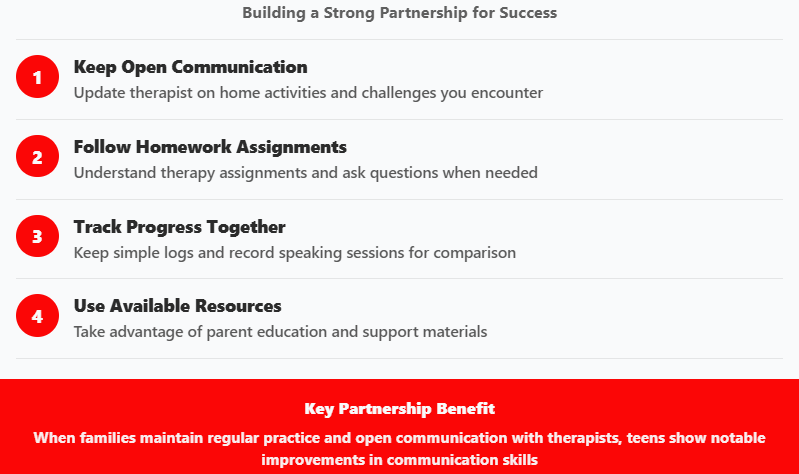

Helping your teen with speech therapy at home can boost their communication progress significantly. As a parent, you play a key role in reinforcing skills learned in therapy sessions.
Research shows children make much more progress toward their speech and language goals when parents take an active role. Home speech therapy provides consistent reinforcement and chances to use new communication skills in everyday life.
Professional therapy sessions happen just once a week for an hour or less. That’s why speech therapy at home is essential to keep momentum going. Start supporting your teen’s speech therapy at home today and watch their confidence soar.
Table of Contents
Why Home Practice Makes All the Difference

Home speech therapy amplifies what your teen learns in the clinic. Studies show that when parents actively practice with their child at home, outcomes improve faster and stronger.
Home speech therapy allows reinforcement of new skills in a comfortable, familiar environment. This helps your teen gain confidence and carry over improvements into everyday situations.
Consistency and repetition solidify new speech skills. It’s better to practice frequently in short bursts than to do one long session infrequently. Two 5-minute practice sessions per day yield better results than a single longer session once a week.
Even just 3-5 minutes of focused home practice three times a day can lead to steady progress over time. The key is regular, quality practice to build your teen’s communication skills and maintain consistency.
Common Speech Challenges in Teens
Understanding your teen’s specific needs helps you target the right speech therapy exercises at home. Here are the most common areas teens may need help with:
Articulation Difficulties
Many teens work on pronouncing certain speech sounds correctly. Sounds like “R,” “S,” or “L” are famously tricky and can linger if not fully mastered in childhood. Your teen might substitute or distort these sounds, affecting their pronunciation.
Speech Fluency and Stuttering
If your teen struggles with stuttering, they may benefit from techniques to manage the pace and rhythm of speech. Breathing exercises are particularly useful. Creating a low-pressure, patient environment at home is crucial.
Language Disorders
Some teens have ongoing language development challenges. They might struggle with finding the right words, forming sentences, or grasping vocabulary. Others may have social communication issues, like trouble with conversational skills. These language disorders require targeted support.
Apraxia
This is a motor speech disorder where a person has difficulty planning the movements needed for speech. Practice often involves repeating syllables combinations and gradually building up from simple syllables to longer words.
If you suspect your teen has any speech delays that haven’t been formally assessed, consider getting a professional assessment. A thorough assessment ensures your home efforts align with what your teen truly needs.
Creating the Right Environment and Routines

One of the best ways to help your teen succeed is to create a positive, supportive environment for activities. Start by setting aside a regular time and quiet space for home speech therapy activities.
Structured routines help make speech work a natural part of daily life. Try practicing every weeknight for 10 minutes after dinner. Consistency is key – regularly practicing skills in various settings helps teens internalize what they learn.
Make sure the practice space is comfortable and free from distractions. Turn off the TV and silence phones for a few minutes. By minimizing distractions and choosing a quiet area, you create an environment where your teen can focus.
Try to incorporate activities into everyday routines as well. You could practice a few target words each morning during breakfast or have a quick review of flashcards while driving to school. Integrating activities into daily routines gives your teen natural opportunities to use their skills in context.
Use positive reinforcement and encouragement. Praise your teen for their efforts and celebrate even small improvements. This builds their confidence and motivation. Some families use token systems or charts even for teens to track progress and celebrate milestones.
Be patient and keep the mood light. If your teen is having an “off” day, it’s okay to shorten the session or try different activities. The goal is to make home care speech therapy a positive experience.
Practical Activities and Techniques
When it comes to speech therapy activities, variety and fun go a long way. Think of yourself as a “coach” helping your teen practice through engaging activities.
Articulation Exercises: Practice targeted articulation at home using word lists or flashcards for specific phonemes. Have your teen repeat these words, paying attention to tongue and lip placement. Using a mirror is a classic technique – your teen can watch their mouth movements to improve pronunciation.
Tongue twisters are another fun way to practice pronunciation once your teen can make the sound in single words. For instance, if “S” is the target sound, try “Sally sells seashells by the seashore,” slowly at first, then faster to enhance pronunciation skills.
Building Vocabulary and Language Skills: Books are fantastic tools for expanding vocabulary and comprehension. Choose reading material that interests your teen and take turns reading aloud. Discuss new vocabulary words you encounter. Reading books together naturally builds vocabulary in context.
Try storytelling games where you start a story and have your teen continue it. This practices narrative skills and spontaneous language. Create visual aids like word charts to review tricky vocabulary periodically.
Fluency Techniques: If speech fluency is a concern, work on strategies your teen is learning in therapy. Practice slow, relaxed speech together. You can deliberately speak slower in conversation and encourage your teen to match your pace.
Breathing exercises are very useful. Practice taking a deep breath before speaking or pausing for a gentle breath between phrases. This can prevent the rushed feeling that often makes stuttering worse.
Making Practice Fun with Games and Technology: Activities don’t have to feel like homework. Use games like Charades for describing and vocabulary building, or Taboo for quick thinking and word retrieval. Games make practice enjoyable while building skills.
Many speech therapy apps turn pronunciation practice into simple games. Some apps present flashcard pictures and record the user’s voice so they can hear their pronunciation. Technology can be a powerful motivator for teens.
Consider video modeling – watching short videos of clear speech and then practicing or mimicking them. You might watch a clip of a good public speaker, then have your teen practice a line or two to improve their pronunciation.
Visual Aids and Tools: Visual aids enhance almost any speech therapy activity. Picture flashcards give a visual representation of the word or sound, helping with memory and understanding.
Other visual aids include mirror work for seeing mouth positions, charts to track progress, and printed cue cards with strategy reminders. Some teens benefit from writing down difficult words and drawing illustrations next to them.
Create a small “speech therapy toolbox” at home containing therapy materials like flashcards, a mirror, a notebook, and some toys for rewards. Having a speech therapy toolbox talk makes it easy to do a quick practice session anytime.
Working with Your Teen’s Therapist

Your home efforts work best when they align with professional guidance from your teen’s speech therapist. Keep open communication and partnership with the SLP to ensure family involvement stays strong.
Update the therapist on what you’re doing at home and any challenges you encounter. They can provide feedback, adjust your teen’s goals if needed, and suggest new strategies to try.
Many therapists assign homework as part of the therapy plan. Make sure you understand these assignments and ask questions. Following through shows your teen that everyone is on the same team working toward their goals.
Track your teen’s progress over time. Keep a simple log of practice sessions, noting activities done and any successes or difficulties. Some parents record their teen speaking and compare recordings after a month of consistent practice to measure progress.
If you notice plateaus or new concerns, consult with the therapist. They may decide to do an extra assessment or tweak the approach. Remember that progress in speech therapy can be gradual but steady.
Consider teletherapy options if available. Doing therapy online from home allows practice in a comfortable environment with parents more easily involved.
Take advantage of parent education resources your therapist might offer. Many clinics provide handouts or direct you to support groups and materials to strengthen your ability to coach your teen effectively.
Key Strategies for Success

Family involvement makes a huge difference in therapy outcomes. When caregivers maintain regular practice and keep open communication with the therapist, they often see notable improvements in their teen’s communication skills and overall progress.
Focus on specific goals one at a time for mastery. Break complex goals into smaller, manageable steps. Use multiple strategies – speaking, writing, drawing – to reinforce concepts and maintain consistency.
Remember that technology and resources are tools to support practice, not replace it. The most important element is consistent, positive interaction between you and your teen as you work toward their specific goals.
Incorporate listening skills practice into daily conversations. Pay attention to how well your teen processes spoken information and responds appropriately. This builds overall communication competence alongside speech work.
Ready to transform your teen’s communication skills? Start with just 5 minutes of focused practice today, and contact us to discuss the best home strategies for your teen’s specific needs.
How often should we practice speech therapy techniques at home? Short, frequent sessions work better than long, infrequent ones. Aim for 3-5 minutes of focused practice three times a day for the best results with any speech disorders.
What if my teen resists doing speech therapy techniques at home? Keep activities fun and varied, use positive reinforcement, and let your teen have some choice in activities. If they’re having an off day, it’s okay to shorten the session or try different strategies.
How do I know if we’re practicing the right techniques at home? Work closely with your teen’s speech therapist to understand their specific goals and get homework assignments. Regular communication with the SLP ensures your home efforts align with professional recommendations.
When should I expect to see progress from home practice? Progress varies by individual and the type of speech challenge. Some improvements may be noticeable within weeks, while others take months of consistent practice to become apparent.





